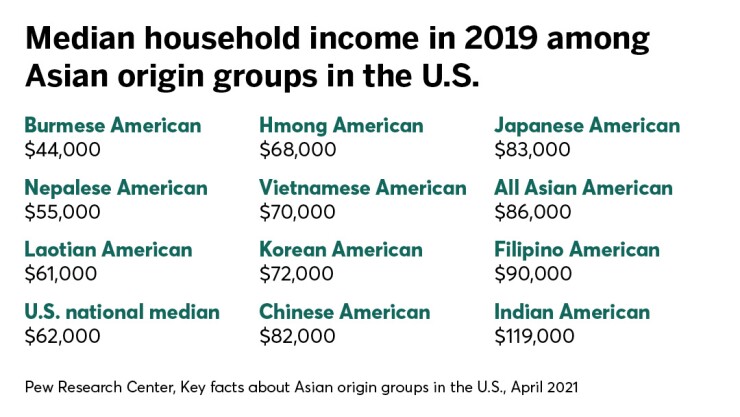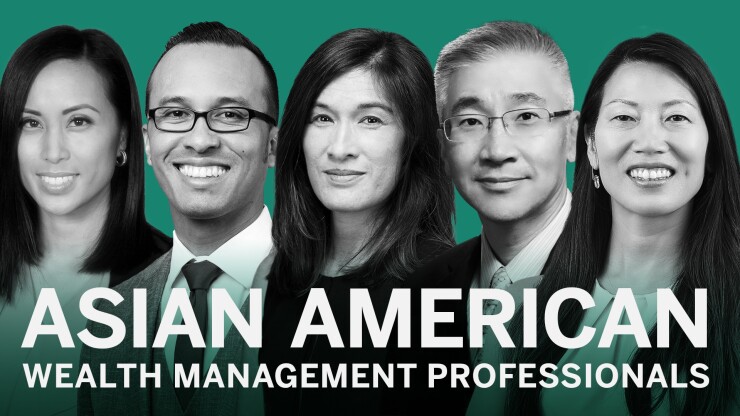Financial advisors Marguerita Cheng and Elijah Souza share two things in common: They’re two of the thousands of Asian American or Pacific Islander wealth management professionals, and both say they didn’t even know their chosen line of work existed when they were growing up.
Souza hadn’t heard of his eventual career until after some older fraternity brothers worked for a large wealth manager after graduation. For Cheng, it took until after her first job in Japan as an analyst. She decided to switch careers by pursuing her CFP certification.
“In college, I didn't realize that there was a distinct discipline where people could earn a living helping people with personal finance,” says Cheng, the founder of Gaithersburg, Maryland-based Blue Ocean Global Wealth. “I get to use my analytical skills. I also get to connect with people and help people not just realize their goals, but clarify them. I feel really blessed to discover the profession.”

For independent broker-dealers in Financial Planning’s 36th annual IBD Elite study, the lack of awareness is just as troubling as the missed business opportunities and inadequate access that many Asian American advisors say remain a problem today. From the forcible seizure of property and internment of Japanese Americans during World War II to the overthrow of the Hawaiian Kingdom in 1893 and the Chinese Exclusion Act of 1882, American history offers all too many examples of hate that hindered generations from building wealth over time. It also, however, shows stories of success and social mobility.
After 18 months marked by the coronavirus pandemic and
Despite the simplicity of the concept of financial planning, it can be “a very difficult, mysterious term” to grasp, says advisor Phuc Quang “P.Q.” Le of Atlanta-based Providential Legacy Group. Le escaped Vietnam as a teenage refugee just before the Fall of Saigon in 1975, and he says he views the role of financial advisor as an opportunity rather than a job.
“We are here for one simple purpose,” Le says. “We would like to help to provide financial security for everybody and also help them to provide a financial legacy.”
Data shortcomings
Asian Americans and Pacific Islanders are 7.7% of the U.S. population, but their exact level of representation in the industry varies depending on the source of the data. For example, the Bureau of Labor Statistics
The CFP Board’s Center for Financial Planning “is currently collecting data on Asian American and Pacific Islander CFP professionals and expects to have the data available in the coming months,” spokesman John Pappas said in an email.
With a lack of visibility in data and in wealth management C-suites, it’s easy to understand why Asian American professionals say they don’t have very many role models of similar backgrounds in the industry and, indeed, why wealth managers would devote time to studying how to recruit from the groups and serve them as clients.
At Cetera Financial Group, executives have received specific cultural training from consultants about working with Asian American clients and the Chinese American banks that use the firm’s BD, says LeAnn Rummel, CEO of Cetera Financial Institutions.
“We are a company that definitely believes in doing our part in helping all Americans achieve financial well-being and having the right access to the advice,” Rummel says.

Banks of Chinatown
East West Bank, an institution whose 39 wealth management and private banking advisors manage $3 billion in client assets, operates its investment program through Cetera. The bank began in Los Angeles in 1973 with a focus on the city’s Chinese American community, and it now spans more than 120 locations in the U.S. and China. The firm’s head of wealth management, Bill Tung, started in the industry more than three decades ago as the first advisor at Citibank’s branch in Flushing, Queens, in New York City, he said in an email.
While some wirehouses have “fairly extensive” numbers of Asian American advisors on their international teams, the industry lacks enough planners with the skills to grasp the cultural nuances required to serve immigrants and their families, Tung says.
“For the financial services industries, whether at a mainstream bank or minority institution, we do need more Asian Americans advisors across the board — especially those who are proficient in multiple languages,” he says. “I would love to see more advisors helping Asian American communities in general.”

Another bank whose wealth management program is serviced by Cetera, Cathay Bank, got its start in the Chinatown area of L.A. as well in 1962 and later expanded across the U.S. and China. Cathay’s U.S. wealth program has 21 registered representatives and $1.5 billion in client assets, according to Philip Hurst, the firm’s director of wealth management and premier banking. Its revenue has soared by triple digits since it returned to Cetera after a brief hiatus with another firm in 2017, and there’s “a lot of opportunity left out there,” Hurst says.
Since the early 2000s, most banks have “wanted to push out a lot of their client experience to technology,” Hurst says. “There's a cultural difference where Chinese Americans like to go to their branch, so it hasn't changed as much for us as our competitors.”
Hurst calls the racism and violence targeting Asian Americans during the coronavirus “a national tragedy.” In some cases, professionals themselves have faced racism in the industry, too.
Overcoming barriers
Le, the advisor with Securian Financial-affiliated Providential, declined to comment beyond what’s publicly available on
These days, Le and his wife, Kim, are expanding their office after
“They feel very comfortable with us because we are very mixed here,” he says. “Just give them an opportunity, a career and advancement and let everybody prove themselves.”
To Commonwealth Financial Network General Counsel Peggy Ho, who’s Taiwanese American, part of making the industry more inclusive is simply giving people chances like the one she received in 2010 when she was on the team managing LPL Financial’s initial public offering.

Still, Asian American professionals often get confronted by the assumption “that we're not leaders, we're followers,” she says, recalling times when she’s applied for positions only to be told, “You're very capable, but I don't think you have the presentation or demeanor.” Ho has been fortunate in her nearly two decades in the industry not to have experienced glaring discrimination, she says.
“When you're talking about financial services and institutions, for the most part we're not talking about blatant outward discrimination,” she says. “Oftentimes it's so nuanced that you're not sure or you maybe don't even realize that it's happening to you.”
At the same time, many Asian American professionals’ experiences display how the industry can serve as a crucial means of social mobility. Advisor Sathya Chey of Rolling Hills Estates, California-based Arise Private Wealth, which is affiliated with LPL’s Strategic Wealth Services, was born in a refugee camp in Thailand after her family’s harrowing escape from the Khmer Rouge genocide in Cambodia.
When her family settled in Long Beach, California, with its large population of Cambodian Americans, they were at first eating out of dumpsters and getting their clothes from Goodwill, Chey says. Eventually, though, her parents became entrepreneurs and she began her 15-year career in wealth management. The industry should reach out directly to more women and minorities who don’t often see their demographic reflected in the profession, Chey says.
“You don't know that it's possible for you,” she says. “If you aren't exposed to it, if you don't know about money, how could that ever be something that you could consider as a career?”
I didn't realize that there was a distinct discipline where people could earn a living helping people with personal finance.
The idea of being a planner also didn’t occur to Souza, an advisor with Santa Monica-based Gerber Kawasaki, when he was younger. Born and raised in Hawaii with a father who was a bus driver and a mother who worked as an office assistant, he says he didn’t know “that a career like this existed where I actually get to help people for a living.”
Souza identifies as Asian American, Pacific Islander and Black, as his parents trace their roots to Portugal and the Philippines. Like Chey, he echoes the value of financial literacy in growing the pool of clients, pointing out that many people believe you need a certain amount of investable assets just to approach an advisor.
“Education just plays such a major role in the world of finance,” Souza says. “You have access to all that information out there, but a lot of times people don't know what they're looking for. I really think that’s where the true value of working with a financial advisor comes in.”
Cheng, the founder of Private Client Services-affiliated Blue Ocean, has a multiracial heritage, too. Her father was born in China and educated in Taiwan before he came to the U.S., while her mother has Irish and Eastern European ancestors. Hiring managers in the industry need to do a “better job of recognizing that there are multiple entry points” for successful professionals rather than the path they followed to come into wealth management.
“My dad left China for a better life, and money doesn't necessarily buy happiness, but money brings opportunity and you don't squander those opportunities,” Cheng says. “Particularly for people from underrepresented communities, this can be a hard profession. But it's very rewarding.”







